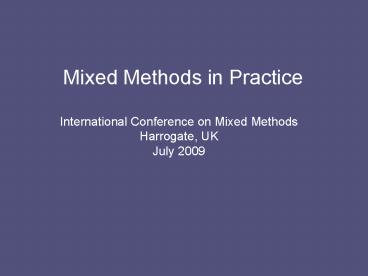Mixed Methods in Practice - PowerPoint PPT Presentation
1 / 35
Title:
Mixed Methods in Practice
Description:
Describe facilitators and challenges ... Bradley EH, Herrin J, Wang Y, Barton BA, Webster TR, Mattera JA, ... Radford MJ, McNamara RL, Barton BA, Berg DN, Krumholz HM. ... – PowerPoint PPT presentation
Number of Views:31
Avg rating:3.0/5.0
Title: Mixed Methods in Practice
1
Mixed Methods in Practice
- International Conference on Mixed Methods
- Harrogate, UK
- July 2009
2
The intersection of
qualitative and quantitative methods can
generate unique insights
3
Aims
Present positive deviance as a mixed method
approach
Illustrate principles with example study
Describe facilitators and challenges
4
A positive deviance approach to understanding
health care quality
Identify positive deviants
Study them using qualitative methods
Generate and test hypotheses quantitatively
Partner with stakeholders for dissemination
Bradley et al., Implementation Science, 2009
5
Consider a positive deviance approach when
Evidence-based practice standards exist
6
Consider a positive deviance approach when
Evidence-based practice standards exist
Outcomes are reliably measured
7
Consider a positive deviance approach when
Evidence-based practice standards exist
Outcomes are reliably measured
There is range in performance
8
Consider a positive deviance approach when
Outcomes are reliably measured
Evidence-based practice standards exist
There is range in performance
Performance is publicly reported and endorsed
9
Example
Understanding the quality of care for acute
myocardial infarction
Structure
Process
Culture
10
Evidence-based practice standards exist
11
Outcomes are reliably measured Risk-standardized
mortality rates
- All cause mortality
- Within 30 days from admission
- Takes into account patient mix
- Attributed to initial hospital
- Classify compared to national average
12
(No Transcript)
13
There is a range in performance among hospitals
14
Performance is publicly reported and endorsed as
a goal
15
Facilitators
and challenges in mixed methods
16
Aims are integrated
Generate hypotheses re factors influencing AMI
mortality rates e.g. data feedback
17
Characterize qualitative factors e.g. need for
trust
Generate hypotheses re factors influencing AMI
mortality rates
18
Characterize qualitative factors
Generate hypotheses re factors influencing AMI
mortality rates
Test hypotheses e.g. data feedback plt.001
19
Characterize qualitative factors
Describe predictors of RSMRs e.g. nature and
process of feedback
Generate hypotheses re factors influencing AMI
mortality rates
Test hypotheses quantitatively
20
Methods expertise is diverse
21
Content expertise is diverse
22
Teams are high functioning, interdisciplinary
Credibility
History
Relationships
23
Project leadership is a critical stimulus
- Expertise in mixed methods
- Maintain credibility with all team members
- Reinforce interdependency
- of methods
24
Yet there are challenges
sampling
data collection
coding
qual data to survey
publication
25
What is the most appropriate sampling strategy?
26
Do we trust the data collection and integrity?
Grand tour questions with content probes
27
Interview guide example
- Have there been efforts to improve the care of
patients with AMI here? - Explore hospital QI efforts broadly conceived,
both formal and informal. What got it started?
How does the organization recognize problems or
opportunities? How do you deal with setbacks? Can
you describe things that needed to get ironed out
along the way? - Specific content probes for QI efforts and
culture - Data feedback
- Learning culture
- Education/collaboratives
- QI teams/successes/failures/constraints
28
How to integrate content and methods expertise
in analysis?
Core team methods experts conduct all coding/
analysis
Content experts inform initial codes
Content experts refine coded transcripts for
their sites
Content experts refine final codes
29
How do we move from qualitative data to survey
instrument?
codes
model
survey domains/ items
30
Publishing considerations what, where, when?
- Qualitative, quantitative or mixed data
- Journal receptivity to various methods
- Sequencing of studies/results
31
Despite challenges, the positive deviance method
can make major impact
32
Thank you!
33
Acknowledgements
Elizabeth Bradley, PhD and Harlan Krumholz, MD,
MS, Yale University Agency for Healthcare
Research and Quality, United Health Care Fund and
The Commonwealth Foundation John Creswell and
Tessa Muncey
34
References
- Bradley EH, Herrin J, Wang Y, Barton BA, Webster
TR, Mattera JA, - Roumanis SA, Curtis JP, Nallamothu BK, Magid DJ,
McNamara RL, - Parkosewich J, Loeb JM, Krumholz HM. Strategies
for reducing the - door-to-balloon time in acute myocardial
infarction. N Engl J Med. - 20063552308 2320.
- Bradley EH, Curry LA, Webster TR, Mattera JA,
Roumanis SA, - Radford MJ, McNamara RL, Barton BA, Berg DN,
Krumholz HM. - Achieving rapid door-to-balloon times how top
hospitals improve - complex clinical systems. Circulation.
20061131079 1085. - Bradley E, Curry L, Ramanadhan S, Rowe L,
Nembhard I, Krumholz H. Research in Action Using
positive deviance to improve quality of health
care. Implementation Science, 2009425. - Bryman A. Barriers to integrating quantitative
and qualitative research. Journal of Mixed
methods Research 2007, 18. - Creswell J, Tashakkoori A. Developing publishable
mixed methods manuscripts. Journal of Mixed
Methods Research 2007, 1107.
35
References
- Curry L, Nembhard I, Bradley E. Qualitative and
mixed methods provide unique contributions to
outcomes research. Circulation, 2009,
1191442-1452. - Krumholz HM et al. Standards for Measures Used
for Public Reporting of - Efficiency in Health Care. Circulation
20081181885-1893. - OCathain A, Murphy E, Nicholl J.
Multidisciplinary, interdisciplinary or
dysfunctional? Team working in mixed methods
research. Qualitative Health Research, 2008
181574-1585. - Stange KC, Crabtree, BF Miller WL. (2006).
Publishing multimethod research. Annals of Family
Medicine, 4(4), 292-294. - Tashakkori A, Teddlie C. (Eds.). (2003).
Handbook of mixed - methods in social and behavioural research.
London Sage Publications.












![get⚡[PDF]❤ Research Methods in Sport Studies and Sport Management: A Practical Guide PowerPoint PPT Presentation](https://s3.amazonaws.com/images.powershow.com/10051224.th0.jpg?_=20240608119)


















